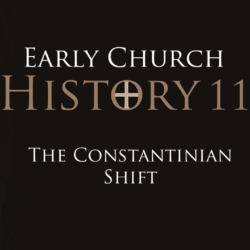Outside of Jesus’ Sermon on the Mount, Paul’s exhortation in Romans 12 is the most direct teaching on how we as Christians should treat our enemies.
Romans 12.14-21
14 Bless those who persecute you; bless and do not curse them. 15 Rejoice with those who rejoice, weep with those who weep. 16 Live in harmony with one another; do not be haughty, but associate with the lowly; do not claim to be wiser than you are. 17 Do not repay anyone evil for evil, but take thought for what is noble in the sight of all. 18 If it is possible, so far as it depends on you, live peaceably with all. 19 Beloved, never avenge yourselves, but leave room for the wrath of God; for it is written, “Vengeance is mine, I will repay, says the Lord.” 20 No, “if your enemies are hungry, feed them; if they are thirsty, give them something to drink; for by doing this you will heap burning coals on their heads.” 21 Do not be overcome by evil, but overcome evil with good.
Richard Hays who had taught at Duke Divinity School for years, writes:
Though the governing authority bears the sword to execute God’s wrath (13:14), that is not the role of believers. Those who are members of the one body in Christ (12:5) are never to take vengeance (12:19); they are to bless their persecutors and minister to their enemies, returning good for evil. There is not a syllable in the Pauline letters that can be cited in support of Christians employing violence. Paul’s occasional uses of military imagery (e.g., 2 Cor. 10:3-6, Phil. 1:27-30) actually have the opposite effect: the warfare imagery is drafted into the service of the gospel, rather than the reverse. He appropriates battle imagery as a way of describing the apocalyptic context in which the community lives, but the actual “fighting” is done through the proclamation of the gospel and through obedient yielding of one’s members to God as hopa (“weapons”) of righteousness (Rom. 6:13)…Rightly understood, these metaphors witness powerfully against violence as an expression of obedience to God in Christ.
[Richard Hays, The Moral Vision of the New Testament (New York: Harper One, 1996), p. 331.]
Although the bible takes a strong stand, we tend to make exceptions and rationalizations. What if Christians around the world all decided we were going to love our enemies?
—— Links ——
- See my website dedicated to this subject: loveyourenemies.wordpress.com
- Check out these other posts on how Christians should love their enemies, including a full length debate between Christians on this issue







It’s good to be reminded of this command regularly. I for one have benefited.
What would happen if we as the people of God were not aggressive toward our enemies?
Is hatred allowed towards some enemies? Maybe this doesn’t apply to all enemies (such as the case in defending our families against those who would corrupt or hurt them)?
Perhaps what is meant by the word enemy is eluding me. Within civil society, and in the context of religious persecution, the example of Christ is clear. But how do I bless his enemy if I die at the hand of my enemy, or in a communist slave labor camp, or during a violent home invasion? Deliberate helplessness seems to me an abdication of responsibility. Jesus told Pilate that if this world was his kingdom his servants would fight to protect him. John 18:36 So Jesus did not say that in all situations we are not to fight.
You had a good question Thomas. Although we may find it difficult to love our enemies, it is probably because we keep reverting to our fleshy spirit. It appears that since I was an enemy of Jesus, he loved me unconditionally and then gave me a command to do the same. Having thus been saved by Jesus into life everlasting, why would we worry about our earthly life anymore. We are to serve. The Anabaptists did a good job of it. I don’t feel we would be abdicating any responsibility to our family in not physically defending them, but I would be abdicating my responsibility to love my enemy because my savior commanded me to do that. The early church with writings by Tertullian and Hippolytus clearly show that the early church forbid serving in the Roman army and there is no recorded case in those first two centuries of a “christian” taking the life of another human. Of course, it resulted in many times in an early believer’s untimely death at the hands of Rome and Nero. I highly recommend reading The Epistle of Mathetes to Diognetus which is part of the Ante Nicene Fathers. The chapters are short and chapter 5 entitled the Manner of Christians, gives a good insight on lifestyle of the early church before it became weaponized. Here is the link. http://www.newadvent.org/fathers/0101.htm God bless.
I hear you, Ray, and can’t say I wouldn’t commit violence to protect myself or others. But that shouldn’t be on the table for us if we are completely committed to Jesus’ words. Jesus’ true kingdom is a spiritual one, which aligns well with Paul’s statement in his letter to the church in Ephesus that we don’t fight against flesh and blood but the spiritual rulers of this world and evil forces of the spiritual realms. It is absolutely telling that He didn’t do a thing to defend Himself during His arrest — even stopping Peter from his sword-swinging — or His trial and execution.
I hope this way-after-the-fact response is of some small value.
At the heart of Jesus’ commandments is a seeming quandary, i.e., how do we love both neighbor and enemy at the same time?
For example, you see your neighbor being assaulted and it would be a sin for the Christian just to ignore such evils.
Hey Ray,
Thanks for writing in. I realize this may sound like an absurd position to take if you haven’t considered it before. It sounded bizarre when I first heard it too, but the univocal message of Jesus and the apostles is that his followers are to love our enemies. Loving our enemies is not helplessness and it’s not quite the same a pacifism either. The pacifist is against violence. Period. The Christ-follower is for loving the enemy whether that takes violence or not. (A classic example of using violence to express love to someone is a doctor who has to saw off a limb to save the patient.) Ultimately, loving the enemy requires serious faith: faith that God “will not let you be tempted beyond your ability, but with the temptation he will also provide the way of escape, that you may be able to endure it” (1 Cor 10.13). We should not presuppose atheism when considering hypotheticals. If God is there in the situation then the person of faith should break commitments to both cowardice and violence and find a third way.
I’ve written a paper on this and there’s also a great youtube debate with competent representatives of booth sides of this issue.
The NT biblical commands to love one’s neighbor as oneself, to love the alien, to love the enemy and to not take personal vengeance all come directly from the Old Testament. At the very same time Old Testament believers were commanded to also carry out capital punishment against numerous crimes against fellow Israelites, aliens and enemies. They were also directed to participate in just wars according to God’s commands.(See Ex. 20-24; Lev. 19-20; Proverbs, etc. for all of the above). The fact that they were commanded to do all of these is not contradictory; rather, in biblical thinking it is possible to love one’s neighbor, the alien, and enemies at the very same time as carrying out biblical justice against those who criminally harm/kill others, thus, defending the community of God’s people against evil. This was especially the responsibility of the governing authorities of Israel, that is, the elders, judges, kings, etc. No one in the Old Testament thought that these judicial acts contradicted the ethical commands to love their fellowman whether fellow Israelite, alien or enemy. That way of thinking is based on a misunderstanding of statements of Jesus, especially, in the Sermon on the Mount and then of the Apostles in the Book Acts and NT Letters. However, the NT evidence rightly understood – set against the background of the OT – actually shows that the OT way of thinking continued into the NT and that the NT believers continued to believe that there was no contradiction between love for one’s neighbors, aliens, or enemies and proper judicial acts in protection of individuals and the common good of society. Rather, as in the OT, biblical love and justice work together in life and, as with other biblical principles, help to qualify and define each other in the real situations of life. These same principles are taught together – without contradiction – in Exodus 20-24 and in Lev. 18-20 in the OT. In the same way they are taught together – without contradiction – in Romans 12-13. In fact, in Romans 12 Paul quotes directly from the Old Testament to substantiate his points about not repaying evil with evil, not avenging oneself, and loving one’s enemies. These are not new principles; rather, they are bedrock principles of the OT and now even more so in the NT. In Romans 13 Paul then expounds the God-ordained judicial authority of proper government in promoting the common good and in carrying out God’s vengeance on the wrongdoer. This is a summation of the proper role of God-ordained government in this present evil age from Genesis to Revelation. Anyone who properly fulfills this role in the OT or NT eras – unbeliever or believer – is “the public servant of God attending continually to this very thing” of proper God-ordained justice. Just as believers could serve in such positions in OT times both in the nation of Israel as well as in pagan nations/empires, etc. so could, did, and can, Christian believers serve in such governing roles the new covenant Christian era as well. The idea that Christians believers who are commanded to pay taxes for the promotion of this governance and to give honor and reverence to those “public servants of God” are nevertheless specifically excluded by Christ, the apostles, etc. from serving in these positions is about as hypocritical a way thinking and acting as one could possibly think of. Nowhere, however, does the text of Romans 13 (or any other NT text) say any such thing; instead, proper governmental authority is always upheld in the NT and Christians who hold such governmental positions are never once in the NT expected to depart from their governmental positions either upon conversion or otherwise. This idea of governmental service with “the sword” being something “unholy” for Christians to participate in is read into the text by many, especially pacifists, such as Richard Hays, John Howard Yoder, Stanley Hauerwas, et al, and is often based on the Anabaptist Schleitheim Confession of 1527 which delcared that it was not appropriate for a Christian to serve as a magistrate. However, the OT and NT views of people in God-ordained governmental service as “the public servants of God” as set forth here and elsewhere is the most highly praised of any secular service in both the OT and NT. Paul himself claimed his rights as a Roman citizen, relied often on Roman protection and insisted that if he was guilty of anything deserving death then he should be justly put to death (eg. Acts 25:6-12). Christian believers not only can, but also should, see governmental service in this God-ordained light and may many of them choose it today. For a brief overview of this subject see the excellent section on Capital Punishment and Just War in the ESV Study Bible, pp. 2550-2555.
Hello Richie,
Thanks for engaging on this important issue. I find myself unconvinced of your position that the Old Testament supports loving one’s enemies for a couple of reasons. Firstly, the famous “love your neighbor as yourself” statement in Leviticus 19.18 specifically refers to one’s countryman. The idea was not that the Israelites would express love to, say, the Philistines, for example. This is what was so radical about Jesus’ statement in Matthew. Over and over he said, “You have heard it was said…but I say unto you.” He is quite consciously doing something new, pouring new wine into new wine skins. Israel was victim to a foreign occupying Roman army, yet Jesus said to love them. Furthermore, when the war came about, Jesus’ advice was to flee rather than fight. This is all the more striking because by anyone’s definition the war of 66 was a just revolutionary war. And yet…the Christians en masse fled rather than fought. This general mindset prevailed in the 2nd century and 3rd until the church began to merge with the government under Constantine in the 4th. The Anabaptists and the Schleitheim confession of the 16th century were recovering the original form of Christianity that had been lost. They did not think it was possible to claim that killing someone was loving. It’s not loving since love is acting for someone’s good.
Sean, thanks for your comments. In response to a few of the points you made I’m afraid I can only reemphasize what I’ve already written above in my first post. I think my points are clear and that the biblical viewpoint I present is also correct. But, of course, that is for you and others to decide about for yourselves as you also “search the scriptures to see if these things are so.” In sum, the biblical principles of love for neighbor, alien, and enemy do not contradict the execution by believers of judicial or military acts of justice including to the point of death; rather, they qualify, clarify and help define each other. That is true in both the OT, the NT and in the entire Christian era including today. The articles I mentioned above in the ESV Study Bible and the ESV Study Bible notes on the particular passages on the Sermon on the Mount, Romans 12-13, etc. do a very good job of explaining the most important points of all of this. The NIV Study Bible also does a good job in its study notes. Of course for details one needs to consult the best commentaries, etc. As for the post-NT history you present in support of Christian non-violence I do not think it has much value. I say this as a historian myself who has studied and taught Ancient, European and US history for many years. The literature available – little that it is – from the first few centuries after Christ show a difference of view of Christian participation in the Roman military, etc. and of the use of the sword. Most of the so-called early church fathers are opposed to it – as you have shown; however, we also know that one of the reasons that they speak against it is that so many ordinary Christians disagreed and were actually joining the military, etc. Most importantly, however, these church fathers are unreliable guides to correct NT interpretation since it is evident that they are wrong about many NT doctrines, topics and practices. By the same token, both the major reformers of the Reformation such as Luther, Calvin, et al and the Anabaptists deserve our profound respect given the difficulty of the times they lived in. Each group claimed to be “restoring Christianity” and each group was partially right. However, on the issue of Christian non-violence I believe that the major reformers were on the whole correct and the Anabaptists were on the whole wrong. In general, the Anabaptists strayed from salvation by grace and to a great degree turned the Sermon on the Mount into a new system of legalisms to which proper obedience – in their view – was necessary for salvation. The major reformers on the other hand, believed strongly in salvation by grace and believed that good works were the result of an obedience of [which comes from] saving faith. The latter view is clearly the correct new covenant view (e.g. Eph. 2:8-10). The difference here is important and it is also why so many people of the Anabaptist tradition are suspicious of the true salvation of other professing Christians who disagree with them about their interpretation of the Sermon on the Mount, especially with regards to non-resistance to evil. Finally, as to the Jewish War of A.D. 66, I don’t think this has much relevance in this debate. One can certainly argue “just cause” in the case of the Jewish nation; however, that is probably the only principle that was fulfilled amongst the many requirements of what later became known as Just War theory. That is precisely why just war theory and thinking is so valuable – it actually endeavors to find the best solution to any situation that could possibly result in war. Apparently, the solution for the Christian believers of that time was the very legitimate one of – flee to the mountains. Well, that’s enough. I hope you, your family, and your entire church community have a great Christmas and holiday season. My thanks to you for all that you are doing to serve our God and his people, including via Restitutio.